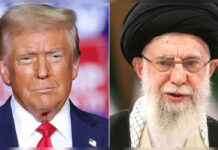X: @the_news_21
Taiwan is gearing up for its presidential elections on Saturday, with results expected to be revealed later in the evening, according to reports from Bloomberg. The elections take place against a backdrop of escalating tensions between Taiwan and China, as the latter claims the island nation as part of its territory, challenging Taiwan’s sovereignty.
In recent times, China has heightened its provocative actions, including the intrusion of fighter jets into what Taiwan considers its airspace. The geopolitical standoff has put the focus on the strategic significance of Taiwan, particularly its growing ties with the United States, which China views with increasing concern.
China’s President Xi Jinping has openly discussed intentions to unify China, hinting at the possibility of a military invasion of Taiwan if deemed necessary. The South China Sea’s proximity adds another layer of complexity to the strategic interests of both China and the US in the region.
Beyond the geopolitical tensions, domestic issues are also weighing heavily on the minds of Taiwanese voters. Economic concerns, such as unaffordable housing and wage stagnation, are significant factors influencing the choices of the electorate.
Vice President Lai Ching-te, a member of the ruling Democratic Progressive Party (DPP), is vying to become president and secure an unprecedented third term for the party. Lai advocates for closer ties with the United States, a stance that has drawn criticism from China, which labels him a separatist.
Lai, a former surgeon who entered politics to safeguard Taiwan’s democracy, cast his vote in Tainan, urging citizens to participate enthusiastically. “I encourage everyone around the country to vote with enthusiasm and show the vitality of Taiwan’s democracy,” he stated.
Hou Yu-ih, a key candidate from the opposition Kuomintang (Nationalist Party), has taken leave as the mayor of New Taipei to run for president. Promising to strengthen Taiwan’s defense capabilities and restart dialogue with China, Hou aims to address the severed communication between Beijing and Taipei, which halted eight years ago.
Ko Wen-je, former mayor of Taipei and member of the Taiwan People’s Party, provides an alternative for Taiwanese voters beyond the two major parties. Popular among the youth concerned about economic prospects amid tensions with China, Ko is the first-ever presidential candidate from the Taiwan People’s Party.
As Taiwan navigates through these elections, the choices made by voters will not only determine the country’s leadership but also have broader implications for its relations with China and the international community.








get cheap clomid online clomiphene usa where buy cheap clomiphene where to buy clomid tablets can i buy cheap clomid no prescription clomid can i order clomid without rx
Thanks on sharing. It’s acme quality.
This is the stripe of glad I get high on reading.
azithromycin generic – sumycin pills flagyl over the counter
purchase semaglutide pill – semaglutide without prescription periactin 4 mg drug
order motilium 10mg – tetracycline buy online purchase cyclobenzaprine
buy augmentin paypal – atbioinfo.com buy cheap ampicillin
oral esomeprazole 40mg – https://anexamate.com/ esomeprazole 20mg brand
buy generic coumadin for sale – blood thinner cozaar 50mg pill
order generic mobic – https://moboxsin.com/ oral meloxicam 15mg
top ed drugs – https://fastedtotake.com/ buy ed pills generic
cheap amoxicillin online – oral amoxil cheap amoxicillin pills
diflucan 100mg cost – on this site order diflucan 100mg without prescription
buy cenforce 50mg sale – order cenforce 50mg online cheap cenforce 100mg canada
cialis manufacturer coupon 2018 – ciltad gn how long does cialis stay in your system
cheap cialis for sale – https://strongtadafl.com/ tadalafil generic reviews
how to get zantac without a prescription – brand ranitidine zantac 300mg ca
sildenafil sandoz 50mg – https://strongvpls.com/ viagra sale melbourne
I’ll certainly return to read more. https://buyfastonl.com/furosemide.html
This is the kind of enter I recoup helpful. generic nolvadex
Thanks an eye to sharing. It’s outstrip quality. https://ursxdol.com/provigil-gn-pill-cnt/
This is the tolerant of post I recoup helpful. https://ondactone.com/product/domperidone/
I am in truth delighted to coup d’oeil at this blog posts which consists of tons of worthwhile facts, thanks towards providing such data.
https://proisotrepl.com/product/toradol/
The thoroughness in this section is noteworthy. http://www.dbgjjs.com/home.php?mod=space&uid=531987
forxiga 10mg drug – click buy cheap dapagliflozin
xenical medication – https://asacostat.com/ where can i buy orlistat
More delight pieces like this would make the web better. http://bbs.dubu.cn/home.php?mod=space&uid=405181
With thanks. Loads of expertise! cenforce en pharmacie
This is the kind of advise I find helpful.
Với giao diện mượt mà và ưu đãi hấp dẫn, MM88 là lựa chọn lý tưởng cho các tín đồ giải trí trực tuyến.
利用强大的谷歌蜘蛛池技术,大幅提升网站收录效率与页面抓取频率。谷歌蜘蛛池
kuwin sở hữu kho game đa dạng từ slot đến trò chơi bài đổi thưởng, mang đến cho bạn những giây phút giải trí tuyệt vời.
Tham gia cộng đồng game thủ tại Go88 để trải nghiệm các trò chơi bài, poker phổ biến nhất hiện nay.
Tham gia cộng đồng game thủ tại Go88 để trải nghiệm các trò chơi bài, poker phổ biến nhất hiện nay.
online casino instant play
best casino slots online
best mobile casino real money
mgm sports betting betmgm-play mgm grand online betting
Awaken your inner gambler with intuitive interfaces and easy navigation. In crown coins casino online, new players get matched deposits. Play smart and win big!